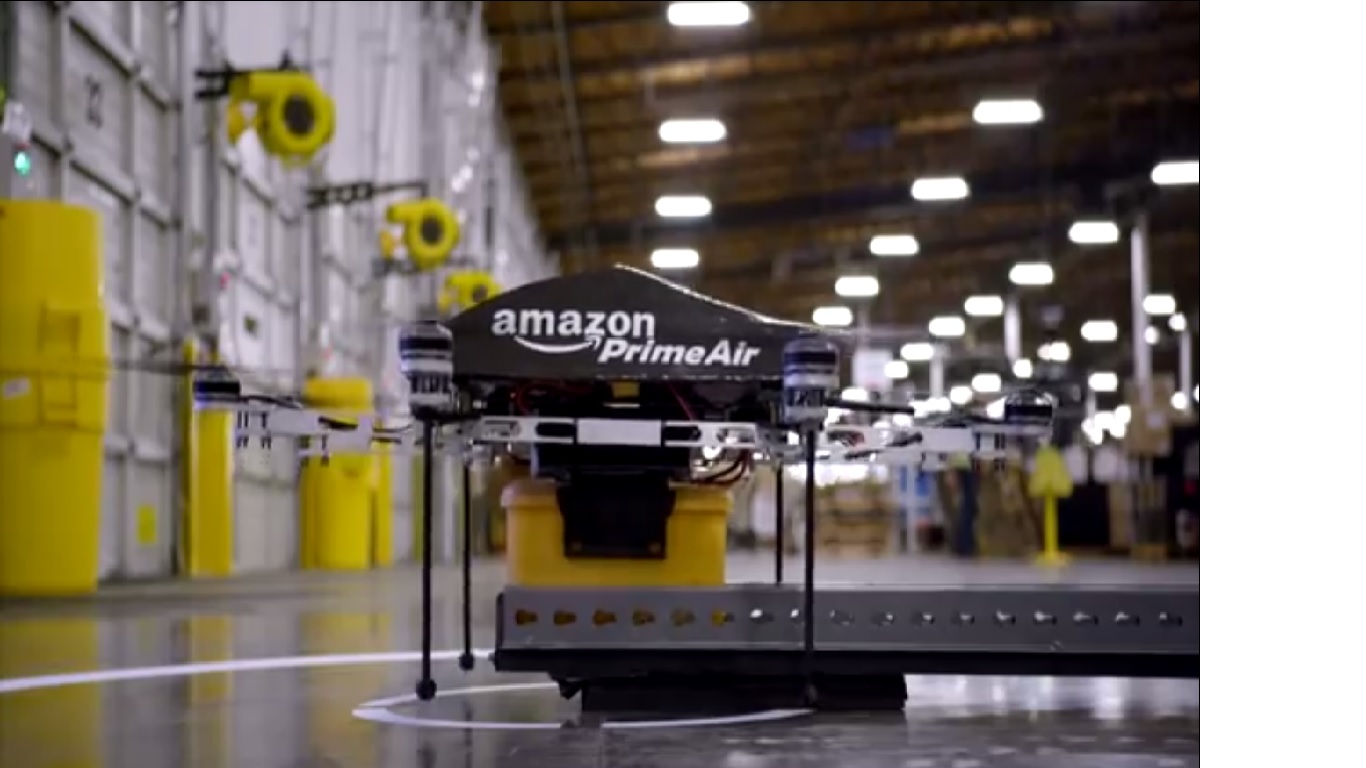Amazon delivery drones to be banned by US authorities
Amazon’s fleet of delivery drones could be grounded if the FAA gets its way

Sign up today and you will receive a free copy of our Future Focus 2025 report - the leading guidance on AI, cybersecurity and other IT challenges as per 700+ senior executives
You are now subscribed
Your newsletter sign-up was successful
Amazon's futuristic drone delivery project could be stopped in its tracks by the US Federal Aviation Administration (FAA).
FAA documents call the delivery of packages to people for a fee a non-hobby or recreational usage of drones, qualifying it as a commercial purpose. Using the drones for commercial purposes, it argues, should be illegal due to modern regulations on unmanned aircraft.
An earlier FAA request to ban drone activity was shut down by a US judge, who claimed that the group did not have the authority to prohibit commercial usage of hobbyist equipment.
Amazon is more than likely aware of the restrictions placed on its delivery drone service, whether before or during operation.
Offering packaging and delivery for free would not allow the retail giant to get around the legislation either: the document stipulates that free shipping constitutes a business purpose too.
The commercial usage of drones is a legal grey area. In the UK, as in the US, regulations state that the operator of a drone or unmanned air vehicle (UAV) must keep visual contact with the craft at all times.
Innovations in first-person video recording and transmission on UAVs, however, has meant that pilots can now maintain contact with the drone while not having it within physical sight.
Sign up today and you will receive a free copy of our Future Focus 2025 report - the leading guidance on AI, cybersecurity and other IT challenges as per 700+ senior executives
The Civil Aviation Authority (CAA), the UK's governing body on UAV regulation, specifies that any drone under 20 kilograms and equipped with video recording equipment or cameras (as would be needed for long-distance flight) must not pass within 150 metres of a congested area.
Cities, towns and villages are effectively a no-fly zone for UAVs under current EU and US law. This means that although there may not be a sizable fleet of Amazon delivery drones for a number of years, there will be a sizable amount of paperwork to get through.
Amazon has said that putting the tech into use will take time as it waits for rules and regulations to catch up to the technology.
Helen McKenzie, UAV project lead and pilot at Remote Aerial Surveys, disagrees: "At present it is not necessarily a case of regulation catching up to technology, but the reverse," she told IT Pro.
"The main technological issue is that very few UAVs are capable of carrying articles which weigh a significant amount for a long enough period of time.
"Unless there is considerable change in the regulations currently governing UAVs and an advance in technology enabling longer flight times and heavier lift capabilities, the use of UAVs for deliveries is likely to remain a gimmick for the foreseeable future," she added.
-
 How the rise of the AI ‘agent boss’ is reshaping accountability in IT
How the rise of the AI ‘agent boss’ is reshaping accountability in ITIn-depth As IT companies deploy more autonomous AI tools and agents, the task of managing them is becoming more concentrated and throwing role responsibilities into doubt
-
 Hackers are pouncing on enterprise weak spots as AI expands attack surfaces
Hackers are pouncing on enterprise weak spots as AI expands attack surfacesNews Potent new malware strains, faster attack times, and the rise of shadow AI are causing havoc
-
 January rundown: Amazon layoffs and the return of XPS
January rundown: Amazon layoffs and the return of XPSITPro Podcast This year's tech layoffs have just begun, as Amazon sheds 16,000 workers in one go
-
 Amazon is cutting 14,000 roles in a bid to ‘operate like the world's largest startup’
Amazon is cutting 14,000 roles in a bid to ‘operate like the world's largest startup’News The layoffs at Amazon mark the latest in a string of cuts in recent years
-
 ‘Lean into it’: Amazon CEO Andy Jassy thinks enterprises need to embrace AI to avoid being left behind – even if that means fewer jobs in the future
‘Lean into it’: Amazon CEO Andy Jassy thinks enterprises need to embrace AI to avoid being left behind – even if that means fewer jobs in the futureNews Amazon CEO Andy Jassy thinks companies need to "lean into" AI and embrace the technology despite concerns over job losses.
-
 Microsoft workers face a fresh round of layoffs – here’s who could be impacted
Microsoft workers face a fresh round of layoffs – here’s who could be impactedNews Microsoft will cut 6% of its workforce, equivalent to around 6,000 workers, as part of its latest cost-cutting drive.
-
 ‘If you want to look like a flesh-bound chatbot, then by all means use an AI teleprompter’: Amazon banned candidates from using AI tools during interviews – here’s why you should never use them to secure a job
‘If you want to look like a flesh-bound chatbot, then by all means use an AI teleprompter’: Amazon banned candidates from using AI tools during interviews – here’s why you should never use them to secure a jobNews Amazon has banned the use of AI tools during the interview process – and it’s not the only major firm cracking down on the trend.
-
 Amazon's RTO mandate could spark a talent exodus
Amazon's RTO mandate could spark a talent exodusNews A survey of Amazon staff suggests plenty remain unhappy about returning to the office next year
-
 Amazon's RTO mandate just hit a major roadblock – it doesn’t have enough office space
Amazon's RTO mandate just hit a major roadblock – it doesn’t have enough office spaceNews The company has told staff in several locations that it won't have room for them all in time
-
 “There are other companies around”: AWS CEO Matt Garman says employees pushing back on RTO mandates should quit
“There are other companies around”: AWS CEO Matt Garman says employees pushing back on RTO mandates should quitNews AWS CEO Matt Garman says employees pushing back on RTO mandates should quit